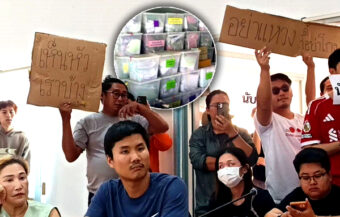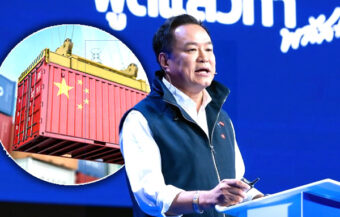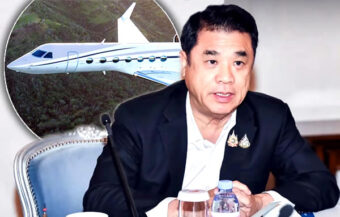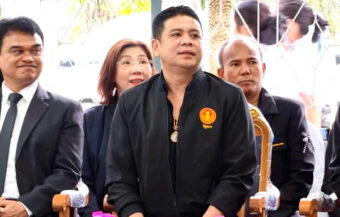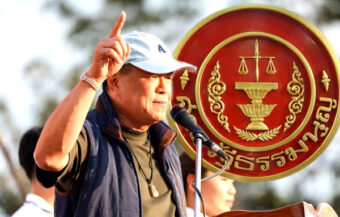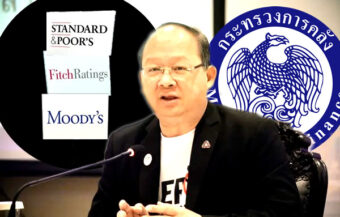Anutin’s policy speech on Monday failed to impress as Pheu Thai legal heavyweight Chusak Sirinil tore apart the interim government, exposing its empty promises, political theatre and doomed constitutional reform plans that lack any real path forward.
Prime Minister Anutin Charnvirakul’s policy speech on Monday did little to inspire confidence and instead deepened growing doubts about the so-called ‘interim’ government and its vague promises of constitutional reform. After the speech, former Prime Minister’s Office Minister and Pheu Thai legal heavyweight Chusak Sirinil dismantled the illusion that this short-term government will deliver real change, noting that the illusion was the very reason the People’s Party backed Anutin’s rise to power in early September. Chusak warned that the government is likely to remain in office far longer than advertised and that talk of constitutional reform is nothing more than political theatre. In short, Thailand is adrift, with no clear direction, no credible roadmap for structural reform, and no plan for tackling the deep-rooted crises besetting the country.
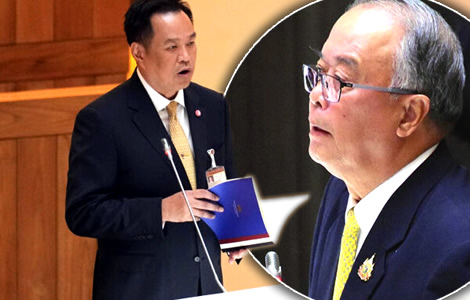
Thailand’s new prime minister, Anutin Charnvirakul, stood before Parliament on Monday to present his government’s policy statement. Yet despite the gravity of the occasion, the speech lacked clarity and conviction. His statement was riddled with vague promises. Certainly, offering little in the way of concrete plans — except two headline items: a constitutional referendum and resolving tensions with Cambodia.
Critics were quick to respond. Among them was Pheu Thai MP Chusak Sirinil, a respected legal expert and former Minister attached to the Prime Minister’s Office. He said what many had already suspected — the government’s proposal for constitutional reform appears destined to fail.
Policy speech raises doubts over interim government and its vague constitutional reform promises
Anutin, who leads the Bhumjaithai Party, rose to power through a fragile agreement with the People’s Party. That party, despite winning the most seats in Parliament, chose to stay in opposition. In return, it extracted a key concession: that Anutin dissolve Parliament within four months of the policy announcement.
That deal raised eyebrows from the start. Many see it as a cynical move to buy time and legitimacy, not reform. Although the government claims it will support a referendum to amend the 2017 constitution, its intentions remain suspect.
The wording of the policy statement was watered down. It makes no firm commitment to a constitutional amendment bill drafted by the Cabinet. Instead, it refers vaguely to “supporting public participation.”
Chusak didn’t mince words. He warned that the political conditions required for constitutional reform do not exist. Even if a draft bill is submitted, he argued, it is unlikely to pass. This is because the Senate — which remains stacked with Bhumjaithai Party associates — will almost certainly block it. To succeed, the draft would require the support of one-third of the Senate. That support is simply not there.
Fragile political deal and Senate composition make passing meaningful constitutional amendments unlikely
At the same time, the Department of Special Investigation (DSI) and Election Commission investigations into the Senate and the massive collusion scandal in the 2024 Senate election are moving forward.
At length, the conclusions of the Election Commission investigation so far implicate the Bhumjaithai Party and its executive. Indeed, this promises to be a time bomb for the Bhumjaithai Party and the government either way at this time.
Meanwhile, the public may be misled by the four-month timeline for the government. Chusak explained that once Parliament is dissolved, the election process could take up to two more months. The Election Commission would then need 60 days to certify results. Only after that can a new Cabinet be formed. In short, the so-called “four-month government” could drag on for eight to twelve months — or more.
That prospect may suit Anutin just fine. As long as he can hold onto power, even temporarily, he maintains control of the machinery of government. Meanwhile, the opposition remains sidelined.
Investigations and extended election timelines put added pressure on the interim government to deliver results
Chusak highlighted a fundamental contradiction. The Memorandum of Agreement (MOA) between Bhumjaithai and the People’s Party calls for a Constituent Assembly to draft a new charter. However, the government’s official policy does not reflect this.
Instead, it falls back on vague language about “supporting” a referendum and listening to public opinion. This inconsistency, Chusak warned, undermines public trust and casts doubt on Anutin’s sincerity.
Importantly, several legal experts have pointed out that a referendum cannot happen without a clear proposal or constitutional amendment bill. The Cabinet must initiate this process. Yet so far, no such bill has been submitted. This raises the risk that the entire reform promise is a political smokescreen.
At the same time, public frustration with the 2017 constitution is growing. Drafted under military rule, it empowers unelected bodies and restricts democratic representation. Several civil society groups and student movements have demanded change. But Anutin’s government has given them no assurance that reform is coming.
Contradictions and public frustration highlight the government’s weak and unreliable approach to reform
Even more troubling, Chusak noted, is the possibility that legal challenges could derail the entire process. The Constitutional Court may be asked to rule on the legality of the referendum or the amendment bill — assuming one is ever tabled. If the court intervenes, reform could be delayed for years. In the meantime, the status quo remains untouched.
The Pheu Thai legal expert noted rising opposition in Parliament to any change to the 2017 Constitution. This comes particularly from the Palang Pracharat Party led by General Prawit Wongsuwan, a key player in the 2014 coup d’état. The Palang Pracharat Party is part of the present government.
Anutin’s broader policy agenda is similarly questionable. He promised to resolve the deadly border conflict with Cambodia through diplomatic means. Yet he also proposed a referendum on revoking the current border memorandum of understanding — a move likely to inflame tensions further. That was confirmed on Monday separately by the new government’s legal adviser.
Deputy Prime Minister Bowornsak Uwanno said any General Election poll was likely to include a referendum question on this.
Rising opposition and border issues further complicate the government’s already fragile reform agenda
In July, Thai and Cambodian troops clashed for five consecutive days. The violence killed dozens and displaced more than 260,000 people. Although a ceasefire has held, the underlying border disputes remain unresolved. A unilateral referendum could provoke retaliation from Phnom Penh and derail any hopes of peaceful resolution.
Anutin also touched on domestic issues. He pledged to reduce household debt, cut energy prices, and stimulate tourism. But his speech lacked specifics. There were no concrete timelines, budget figures, or legislation proposed. Vague talk of “restoring happiness” and “supporting the people” dominated the rhetoric.
He did announce a new economic initiative called “Team Thailand,” which would help businesses weather trade disputes. However, few details were offered about how this team would operate or who would lead it.
In addition, Anutin promised to combat corruption and illegal gambling. He vowed to strengthen natural disaster alert systems and improve environmental protections. Yet these are long-standing problems that have plagued multiple administrations.
Vague domestic policies and a temporary mandate make the government unlikely to deliver on promises
Promises alone will not solve them — and this government, with its temporary mandate, is unlikely to follow through.
Importantly, Anutin admitted that his administration is a minority government and lacks the numbers to pass major legislation. That means every proposal will face tough resistance in Parliament. Even his own allies in the People’s Party are expected to vote against him on key issues.
This political fragility further weakens any attempt to push through structural reforms. If the referendum fails or is blocked, the fallout could be severe. The government’s credibility would collapse. Political instability, which remains a simmering prospect, may surge again. The cabinet sworn in last Wednesday was, for instance, the fifth in only two years.
The promise of reform — which brought millions of voters to the polls in 2023 — will again evaporate.
Chusak was blunt about the consequences. If this government dissolves Parliament within four months without delivering a new constitution, it will have failed the public. Worse still, it will have wasted a rare opportunity for real democratic progress.
Minority status and political fragility threaten to collapse reform efforts and erode public trust rapidly
“I have spoken with the people who made these political deals,” Chusak told Parliament. “They are not confident they can even pass the first reading. If they can’t convince the Senate, or if the Court steps in, the entire amendment effort will collapse. Who will take responsibility then?”
He added that the government’s backpedalling on the MOA shows that even those in power are unsure of their path. The Cabinet has not drafted a bill. The Senate is unlikely to support reform. And no real public engagement has begun.
Constitution may be going nowhere even as moves unfold. Gen Prawit stoutly defends the 2017 version
Strong case for Chaikasem Nitisiri to lead an interim government tasked with Constitutional change
“This is a signal,” he said. “I’m not saying I oppose the referendum. But if this government dissolves Parliament in four months without delivering anything, that would be a terrible shame.”
In the end, the country is left with more questions than answers. Is Anutin serious about reform, or is this just political theatre? Can the government survive long enough to achieve anything meaningful? And if it fails, will the public tolerate yet another cycle of false promises and political incoherence? Politics in Thailand remains lost at sea.
As it stands, the new government has no budget, no majority and no time. All it has are slogans. Whether that will be enough to restore trust in Thai democracy remains doubtful.
Join the Thai News forum, follow Thai Examiner on Facebook here
Receive all our stories as they come out on Telegram here
Follow Thai Examiner here
Further reading:
Constitution may be going nowhere even as moves unfold. Gen Prawit stoutly defends the 2017 version
New cabinet to be sworn in at Dusit Palace in Bangkok on Wednesday September 24th before the King
Anutin planning eight-month economic programme as his PM tenure will extend to the next government
2nd Army chief warns Acting PM Cambodian regime cannot be trusted and that border must stay closed


